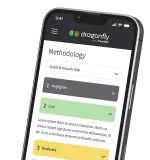Hello there! It sounds like you're contacting us because you're eager to gain work experience at Scorchsoft. Well done for taking the initiative to find employers yourself – it can feel overwhelming when you're new to the professional world.
My name is Andrew, Managing Director of Scorchsoft, which I founded after graduating from the University of Birmingham in 2010.

Like you, I've always been fascinated by computers. My interest was sparked in the early days of the internet when I used to explore my father's work laptop. I used it to hunt for cheat codes for Nintendo's Super Mario 64, but my explorations often resulted in system crashes! The only solution was to reinstall Windows 98.
This fascination led me to delve into the world of websites and programming.
In secondary school, I created an online website hosting the latest Flash games. This project cultivated my coding skills and steered me towards studying Computer Programming at college, followed by Computer Science with Business at university.
That’s not all, though. Personal projects can introduce you to unexpected opportunities.
My simple little website became popular in school, so whenever someone needed a website, they thought of me. This led to small local businesses hiring me to build their websites during school breaks, offering valuable experience in both programming and business. I charged for my work, and the lessons learned helped me grow Scorchsoft after university. It was tough, and I made several years of personal sacrifices, but my tenacity paid off.
I share my journey to encourage you, as I was once in your shoes, embarking on my professional journey and seeking work experience.
However, there's a challenge. Scorchsoft is a small team, and accommodating work experience, students demands significant time and coordination. While we have welcomed a few students over the years, we've learned that it's a considerable commitment for us.
At some times of the year, we often receive over ten work experience requests per week!
I hope you can understand why, unfortunately, we can't accommodate everyone. I suspect you've faced similar challenges with other businesses. You might have to contact many, most will decline, and you're hoping for that one in fifty chance of landing a placement. The reason behind the many rejections is simple: demand for work experience exceeds supply, particularly in the tech industry.
But don't lose heart. I have some suggestions to help you secure some form of work experience, even if it requires thinking outside the box.
How to Secure a Tech Work Experience Placement
Option 1: Explore your existing networks Start by considering your existing connections. You're more likely to secure a placement if you or your parents, friends, or family know someone personally. In business, people often engage with those they like, and the same principle applies to work experience.
Option 2: Play the numbers game If you can't find a placement through direct connections, you might need to approach numerous businesses directly. Expect many rejections, or no response at all. To increase your chances, create a LinkedIn profile and find the business owner's name to personalise your application.
If you've tried both options and still had no luck, it's understandable if you're feeling disheartened. You might even contemplate settling for a basic placement just to satisfy your school's requirements. While this might get your teacher off your back, it's not ideal. It won't be fun and probably won't help you pursue your passion. In this case, consider option 3...
Option 3: Be creative, deliver a project Approach non-tech businesses with a proposal to create a project for them on your own time at home.
Consider these two approaches:
A) "Can I please have work experience at your company? I love computers and think you could really help me become an excellent computer programmer."
or
B) "I see your business does XYZ. I'm a student at XYZ and had a cool idea for something you may find useful. I'm thinking about building a SOMETHING HERE as a school project. Can I build it for your business for free? I can do it from home, and all I'd need from you is some feedback. What do you think?"
Approach A is all about you, and places a lot of responsibility on the business. Approach B is about the value you can bring to the business, and sidesteps the need for them to provide a lot of support.
By creating something real, you'll learn valuable lessons and have a tangible project to showcase on your CV. Employers, like us, look for examples of transferable skills.
When undertaking your project, try to get feedback from the business owner. Ask about their challenges and what they think about your idea. Adjust your project based on their feedback. This will impress your school and demonstrate that you worked closely with the business.
The world is becoming digital, and more employees work from home rather than commuting to an office. Applying this new way of working to your work experience placement is forward-thinking!
Ideas for Your Work Experience Project
Here are some project ideas to kick you off. You don't have to do all of these! It's better to pick just one but do a fantastic job. And, whatever you do, make sure to document the steps you too, and write a short report explaining your progress and what you learned!
- Make a website with Home, About, Services and Contact pages. You can make this yourself with raw HTML/CSS, a WordPress site, or even a free Wix website. Plan your content carefully, and explain your choices!
- Make your own Custom GPT in ChatGPT and see if you can find people or businesses who think it's useful (and collect their feedback, such as via a Google form).
- Write a project plan for how to use social media to release a new imaginary product, then come up with your own logo for it, and set out why customers should buy yours over any competition (Your unique selling point)
- Design a board game, all the rules, and cards or items. This can be done physically with paper or digitally with programming. Bonus points if you design the game to be aimed at a particular audience, and com up with promotional materials such as the box or content for an Amazon listing for it.
- Plan ten social media posts for the company of your choice and show it to them. Make them look great, and reflect on what messaging is best for the company you've chosen. Explain the why behind your decisions!
- Code something cool, like a mini-game the business can promote on social media to collect email addresses. Or an app to record information and email it back to the business owner. You could try asking ChatGPT for ideas!
- Review a business's website and suggest ways things could be improved. For example, better user journey experience, enhanced clarity, stronger value messaging, and conversion rate optimisation tricks.
- Propose a new product to an existing business. Research a business, it's industry, and it's competitors (search and learn), write what you found, then pick one of them and suggest what kinds of products or services they could offer which could improve what they do. Write this up into a report. This doesn't have to be an invention and could be them adopting something their competition does.
- Test an existing app and report back findings. Find an app on the app store, install it, go through every screen and test it works as expected. Try lesser-known apps that might be more likely to have issues. Then log the errors, report them to the business, and ask for feedback. Check out our testing podcast episode to help guide you on how to do this.
- Write a review article and let businesses know about it. Set up a free wordpress.com account or Medium account, pick 5-10 businesses in a certain industry, and write a 3000-9000 word article that compares them across a range of different metrics. Think carefully about what matters to their customers, and review those areas. Look at other comparison articles on the web for inspiration. Then, publish it as an article.
Here is a free work experience report template I've made that you can use to record your project and present it to your teacher.
Contact businesses you're interested in, find the best person or email to contact, think about a project they might value, and ask if you can build it for them. Or simply get cracking anyway then show them aftewards.
If you're unsure what to build, talk to a business and ask them about their challenges or what they might value. You may learn something new and create something you hadn't thought of. This approach also means you don't need to have all the answers right now – you can simply start asking questions.
And if you can't find a company to do the project for, then do the project yourself anyway.
How to create your own work experience with these ideas (without an employer)
Don't jump straight into a project at your computer when embarking on a project. It requires a structured approach. First, select a project you believe you can realistically complete in one to two weeks.
Before diving into development or design, it's crucial to plan your approach thoroughly. I recommend creating a document to outline your plans in a simple list format, followed by drafting some sketches. Ensure you save these files and photograph your sketches to present a tangible record of your efforts for your teacher and as a reference for your work experience outcome. Then, proceed to translate your plans into action. If you encounter setbacks, don't be discouraged.
Failure is often a step towards success in the professional world. It's better to attempt and not fully succeed than to never try. Should you face challenges, document what you've learned from the experience. Remember, not all roles require programming skills. It's perfectly acceptable for your project to culminate in detailed plans if that's where your interests and strengths lie. Focus on producing comprehensive plans if that resonates with you.
What next?
For developing your programming skills, consider checking out CodeAcademy or Juni Online Learning.
I'm interested in hearing about your progress if you do choose to embark on a self-led work experience project like the one outlined above in option 3 and write a report. If you try the above approach successfully, drop us an email at [email protected] and tell us about what you've done or show an example, and send your completed report template. We'd be happy to provide feedback on the project you take on that you can share with your teacher or include on your CV.
If you'd like to learn more about how we operate and how our clients execute their ideas, consider reading my book, 'Execute Your Tech Idea.' There are chapters in this book which explain how to create project wireframes and write a project scope or specification, which are great skills to learn to help you on your career path!
All the best with your work experience journey! I'm confident you'll do great.
Thank you,
Andrew

